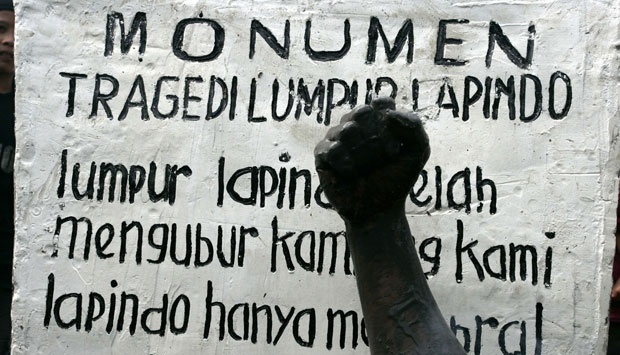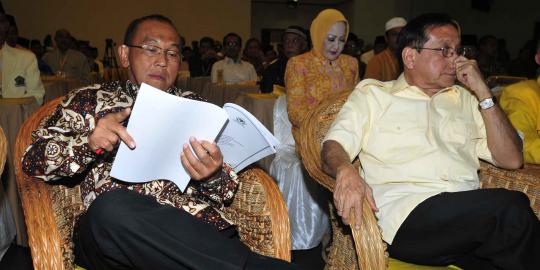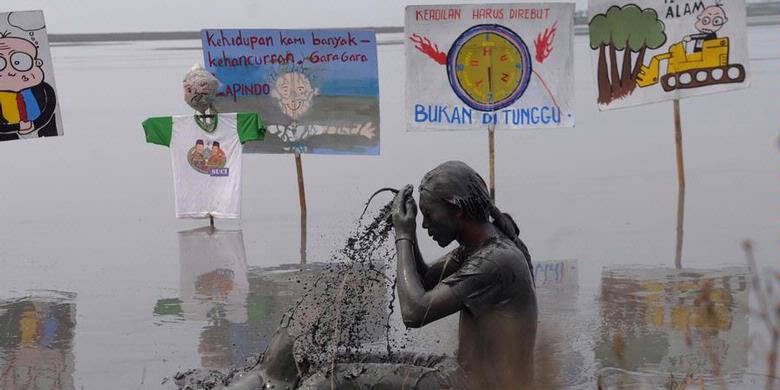Versi PDF unduh di sini.
MENYUSUL kekalahan pasangan Prabowo Subianto-Hatta Rajasa tahun 2014 lalu, Partai Golkar berada dalam posisi tersulit sepanjang sejarah republik ini. Golkar memiliki budaya politik untuk selalu merapat dan berkoalisi dengan pemegang kekuasaan. Di era Indonesia memilih presidennya secara langsung, kandidat Golkar selalu kalah. Namun, Golkar selalu berhasil memperkuat posisi politiknya untuk merapat pada kursi kekuasaan.
Pada pemilihan presiden 2004, kandidat Golkar (Wiranto-Salahuddin Wahid) kalah di putaran pertama. Pada putaran kedua partai pun melimpahkan dukungannya kepada pasangan Susilo Bambang Yudhoyono-Jusuf Kalla. Kalla pun ditunjuk sebagai ketua umum partai periode 2004-2009. Sementara beberapa kader penting masuk dalam kabinet dan pelbagai posisi strategis lainnya.
Pada tahun 2009, kandidat Golkar (Jusuf Kalla-Wiranto), lagi-lagi, kalah dalam pemilihan presiden satu putaran. Akan tetapi, Golkar berhasil mempertahankan posisinya sebagai partai pendukung sang penguasa. Salah satu kader kunci bagi keberhasilan itu adalah Aburizal Bakrie yang terpilih sebagai ketua umum partai, mengalahkan Surya Paloh dalam Munas di Riau, Pekanbaru, Oktober 2009.
Di bawah pimpinan Aburizal, Golkar menginisiasi pembentukan Sekretariat Gabungan (Setgab) koalisi partai pendukung pemerintah dan Aburizal duduk sebagai ketuanya. Berangkat dari perjalanan semacam itu, kita dapat berkesimpulan bahwa dalam peta politik nasional, politisi Partai Golkar tidak pernah merasakan bagaimana menjadi oposisi.
‘Aburizalisasi Golkar’
Tidak seperti zaman sebelumnya, Golkar mulai memperhitungkan kekuatan ‘figur’ (Aburizal) dan menggarapnya sebagai magnet partai. Rasionalisasinya adalah memperkokoh mesin partai warisan Orde Baru yang sudah berjalan baik.
Untuk mencapai tujuan itu beberapa kader penting partai yang tidak sepaham dengan Aburizal dan ide-idenya diberhentikan. Sebagian lain memilih loncat ke partai lain. Mereka tidak sepakat dengan gerakan ‘Aburizalisasi Golkar,’ suatu gerakan menjadikan persoalan personal Aburizal menjadi persoalan kelembagaan partai. Salah satu yang paling kentara adalah, tentu saja, penggalangan dukungan partai atas kasus Lapindo.
Sebagai ketua umum partai, Aburizal tidak perlu harus hadir sendiri untuk mengklarifikasi segala tuduhan publik terkait kasus Lapindo. Dia cukup memfungsikan kader partainya untuk menyuarakan kepentingannya. Hasilnya, kader dan simpatisan partai dari level nasional sampai level kampung telah disulap menjadi agen ‘normalisasi’ kasus Lapindo agar sesuai dengan versi Aburizal, dan Lapindo.
Praktik ‘normalisasi’ itu dilakukan di pelbagai medan pertarungan kekuasaan. Yang paling masif adalah penggiringan opini di ruang-ruang publik. Di DPR, Golkar menginisiasi pendirian Tim Pengawas Penanggulangan Lumpur Sidoarjo (TP2LS) dan memimpinnya. Pada praktiknya, yang dimaksud ‘pengawasan’ adalah melancarkan pelbagai skema penyelesaian kasus Lapindo menuruti kepentingan Aburizal, dan Lapindo.
Golkar adalah kunci bagi lolosnya pengalokasian dana APBN untuk Lapindo. Sejak 2007, trilyunan rupiah uang rakyat telah digelontorkan untuk menangani dan menutupi segala macam akibat dan ulah Lapindo. Tak hanya itu, di bawah kendali Golkar, DPR pun menyatakan lumpur Lapindo sebagai ‘bencana alam,’ alih-alih ‘bencana teknologi.’
Di tingkat lokal, Golkar merekrut beberapa korban Lapindo yang haus kekuasaan menjadi kader partai. Para korban ditawari beragam posisi, mulai anggota legislatif (nasional, provinsi, dan kabupaten/kota) sampai kepala daerah (Sidoarjo), asalkan mereka menyuarakan dan mendukung Aburizal, dan Lapindo.
Dengan demikian, Golkar telah menjadi alat yang sangat efektif bagi Aburizal bukan hanya untuk melakukan ‘normalisasi’ namun juga melepaskan diri dari kasus Lapindo.
Hak angket Lapindo, untuk (si)apa?
Beberapa pengamat politik memprediksikan bahwa pasca pesta demokrasi 2014 lalu Golkar akan mengulang pola yang terjadi sebelumnya, yakni merapat ke penguasa. Pola itu diputus oleh sikap Aburizal, sebagai ketua umum partai, yang bersikeras untuk tetap mendukung Koalisi Merah Putih pimpinan Partai Gerindra. Padahal Golkar mendapatkan suara lebih banyak ketimbang Gerindra.
Sikap Aburizal itu memicu reaksi keras dari sebagian besar eksponen partai. Menjadi oposan bertentangan dengan budaya politik partai. Bibit resistensi pun berkembang, namun casus belli bagi konflik internal Golkar adalah Munas Bali yang memilih kembali Aburizal sebagai ketua umum. Beberapa kader penting mengklaim Munas Bali tidak sah. Mereka pun menggelar Munas tandingan di Jakarta dan mengangkat Agung Laksono sebagai ketua umum partai.
Perseteruan internal Golkar berlanjut menjadi makin runyam ketika lembaga negara lain turun campur. Dalam pelbagai pernyataannya, Wakil Presiden Jusuf Kalla menyatakan dukungannya pada kubu Agung Laksono. Pernyataan itu sangat politis. Eksekutif membutuhkan dukungan dari parlemen bagi terlaksananya program. Tambahan suara dari Golkar di parlemen akan sangat menguntungkan bagi pemerintah. Dalam konteks tersebut, SK Menteri Hukum dan HAM No. M.HH-01.AH.11.01 (23 Maret) yang menyatakan kubu Agung sebagai kubu yang sah menjalankan Golkar sangat problematis.
Kubu Aburizal mengajukan gugatan ke PTUN Jakarta yang pada 1 April lalu melemparkan putusan sela yang memerintahkan penundaan pemberlakuan SK tersebut. Selain itu, kubu Aburizal mewacanakan untuk melancarkan hak angket menggugat keputusan itu, yang langsung mendapatkan reaksi dari kubu Agung untuk menginisiasi hak angket untuk kasus Lapindo.
Filsuf Prancis Jacques Derrida berpendapat bahwa dalam dunia politik hal paling sulit dalam politik bukanlah memperjuangkan kemerdekaan ‘liberté’ atau menciptakan kesetaraan ‘egalité,’ melainkan menjalin persaudaraan ‘fraternité.’Lewat buku Politics of Friendship (2005), Derrida mengungkapkan motif politik persaudaraan tidak murni sosial namun sangat pribadi: menyelamatkan diri sendiri.
Berangkat dari argumen Derrida tentang politik persaudaraan, hak angket Lapindo – jika benar dilaksanakan – perlu dilihat sebagai strategi pendukung Agung Laksono untuk menyelamatkan diri dari kasus Lapindo. Caranya adalah melepaskan beban yang ditimpakan pada Golkar dan mengembalikannya ke pundak Aburizal. Wacana yang dipelihara dan disebarluaskan adalah ‘kasus Lapindo merupakan persoalan pribadi Aburizal dan perusahaannya, bukan persoalan Partai Golkar.’
Kita berharap wacana hak angket Lapindo tidak berubah menjadi, apa yang disebut Derrida ‘simulakra,’ ruang yang diciptakan terlihat seolah-olah penting dan perlu bagi kepentingan bersama, namun sebenarnya hanya dibuat-buat untuk menutupi motif pribadi dari para penciptanya.
Kita sangat mendukung pengusutan tuntas kasus Lapindo. Namun, kita juga berhak dan perlu bertanya: apakah hak angket akan efektif bagi tujuan itu? Kita harus terus mengingatkan pemerintah bahwa ada persoalan sangat mendesak untuk dilakukan: memulihkan dampak dan krisis sosial-ekologis akibat lumpur Lapindo.***
Anton Novenanto, pengajar di Jurusan Sosiologi, Universitas Brawijaya, Malang



